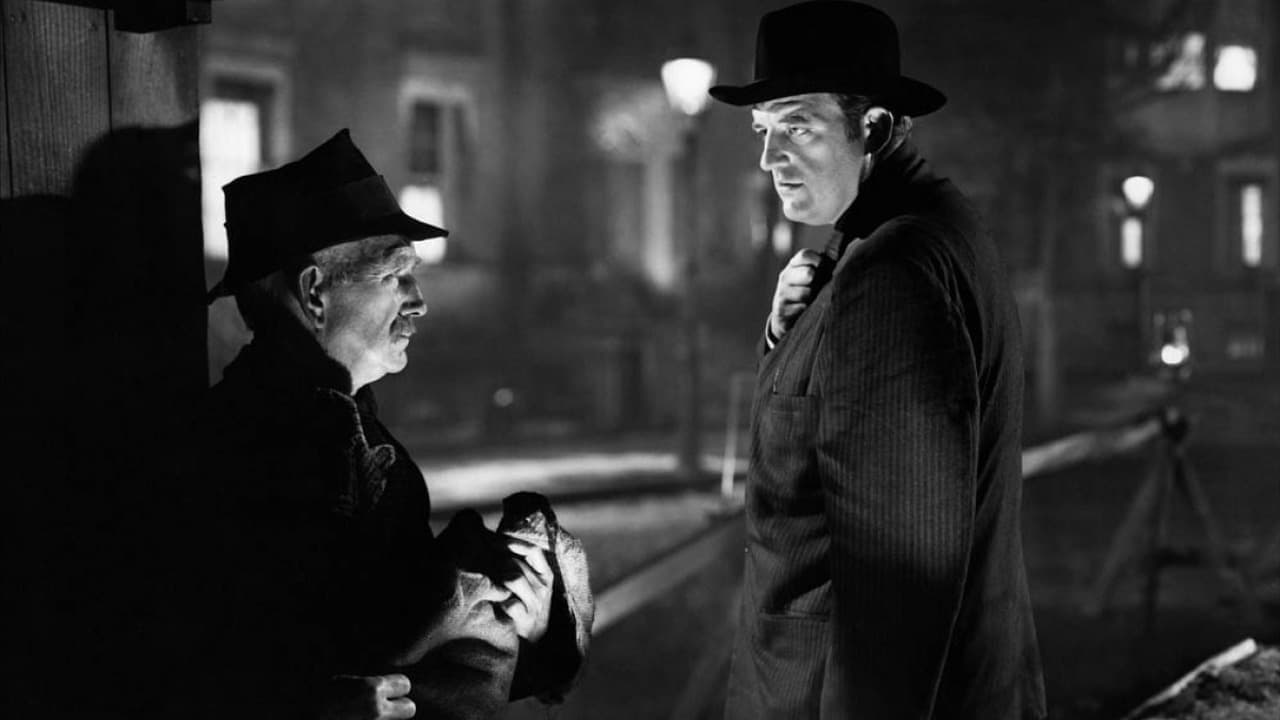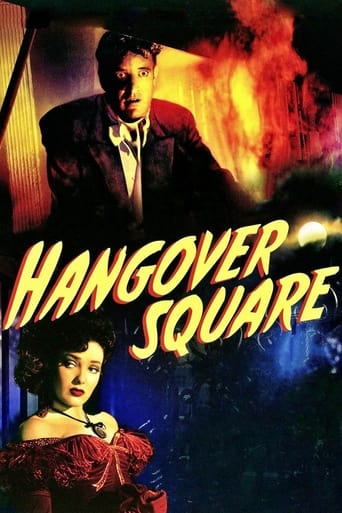

Murder and madness loom large in this Gothic melodrama which is loosely based on Patrick Hamilton's 1941 novel and features a very unusual kind of serial killer. Set in the often fog-shrouded London of 1903, it tells the story of a classical musician who's aware that he has periodic blackouts and starts to become increasingly concerned because, after they've passed, he can never recall what has happened.The man in question is well-respected composer and pianist, George Harvey Bone (Laird Cregar) who's working on a new concerto that has been commissioned by Sir Henry Chapman (Alan Napier). Sir Henry is a famous conductor who says that George's new work (which he would like to debut at one of his upcoming soirees), has every chance of turning the composer into an international success and so George has to work hard to be able to produce a concerto of the required quality by the deadline that Sir Henry has set.After reading a newspaper report about an antique dealer in Fulham who was stabbed to death and had his shop set on fire, George becomes alarmed that the timing of the crime coincided with one of his blackouts and to make matters worse, he also has a dagger in his possession and the coat he was wearing that night is blood-stained. After speaking to his girlfriend Barbara (Faye Marlowe), who's Sir Henry's daughter, the couple go to see Scotland Yard psychologist, Dr Allan Middleton (George Sanders), who after having some forensic tests carried out, assures George that there is no evidence to link him to the Fulham murder. He also offers the view that George's blackouts are probably caused by overworking and suggests that he should relax more and get out and meet some ordinary, everyday people.Following this advice, George visits a local music hall where he enjoys a performance by a sexy singer and later, when he meets Netta Longdon (Linda Darnell), her pianist/manager Mickey (Michael Dyne), who's one of George's friends, tells the singer about George's talent as a composer and they spontaneously write a song together. This proves to be such a money-spinner that the singer, who previously had no interest in George, immediately starts flirting with him and does everything she can to get him to write more songs for her act. George tries to concentrate only on his concerto but is won over by Netta's charms and thinking that she's attracted to him, writes further songs for her. When he realises how deceitful she is, George attempts unsuccessfully to strangle both Barbara and Netta's fiancé before he succeeds in strangling Netta and disposes of her body on a Guy Fawkes Night bonfire. As the net eventually starts to close in on him, George's only remaining priority is to ensure that he manages to perform his completed concerto at Sir Henry's soiree and this leads to the movie's spectacular finale.In 1944, 20th Century Fox had scored a big hit with "The Lodger" which was a "Jack the Ripper" film and so, in an effort to repeat that success, studio head Darryl F Zanuck brought cast members, Laird Cregar and George Sanders, director John Brahm and screenwriter Barre Lyndon together again to produce the same magic with a "Jekyll and Hyde" type story. This ploy worked perfectly by enabling budget savings to be made by using some of the sets from the previous movie for this one and also because "Hangover Square" was regarded as the better film by many fans.The serial killer in this movie whose blackouts are triggered by discordant sounds, is a sympathetic and tragic character because he's a victim of both a mental condition over which he has no control and a scheming femme fatale whose actions precipitate a great deal of the mayhem that he causes. Laird Cregar, in a fine performance, portrays the two very different sides of a man who, in his rational state is gentle, polite and friendly but when unbalanced becomes a crazed killer and a pyromaniac. With strong supporting performances from Linda Darnell and George Sanders, some exceptional expressionistic cinematography and a top class score from Bernard Herrman, this movie provides a great deal to enjoy plus a crazy climax that brilliantly incorporates flashbacks, hallucinations and the movie's fire motif, all accompanied by a fantastic rendition of George's powerful "Concerto Macabre".
... View MoreIn old London town an upcoming composer struggles to reconcile his place in polite society with his suspicions over his behaviour during stress induced blackouts. Then two beautiful women get involved.Enjoyable melodrama loosely based on DJ&MH. The three lead actors are all memorable: the composer with his hyperactive eyes, the smile of his female friend, and the sex-bomb that takes advantage. The pace is good and the music does its job well, with a very convincing turn at the keyboard which fooled me into thinking the actor was playing brilliantly.Only real weakness - the good romance remained superficial. Best thing is the crowd scenes - all done on set, but full of life and rhythm, with great extras and lovely details, creating a rich atmosphere.Overall, good entertainment.ps. The composer and sex-bomb suffered untimely deaths in the real world.
... View MoreA concert pianist is plagued with a mental illness where a specific sound triggers a murderous impulse, this time when he commits murder remains buried in the back of his mind, not understanding the sequence of events which arise, awakening remembering nothing..fragments emerge as time goes by which leave him puzzled, wondering if he may've committed the murders reported.Laird Cregar's phenomenal performance as the haunted pianist, superb sets recreating the Victorian era of London, sweepingly gorgeous camera-work, and a magnificent score from Bernard Hermann all add to what is another masterwork from John Brahm. 20th Century Fox gave Brahm the right tools to bring to life a time and place that feels so incredibly authentic. Unlike The Lodger, Brahm's other masterpiece(..or in my mind anyway), the film is solely focused on Cregar, he gets the entire film. The Lodger provided the great George Sanders with a more lucrative role, but even in Hangover Square, he still impresses(..when does he not?)as a police psychiatrist who suspects Cregar might be the person responsible for the murder of a crooked antique dealer, and behind an attempted strangling of Barbara Chapman(Faye Marlowe). Linda Darnell has a juicy part as Netta Longdon, a dance hall girl who uses George Harvey Bone's(Cregar)affection for her to gain success, secretly wooing a theater producer, Eddie Carstairs(Glenn Langan). Barbara adores Bone and pleads with him to continue a concerto which could bring him the fame and fortune he deserves, knowing that his talent is better utilized elsewhere besides preparing music for Netta, who doesn't love him. We watch as Netta manipulatively goads Bone into providing her with a concerto that will push her over into stardom, playing on his adoration for her, understanding that once he gives her what she so desires, she can dump him for Carstairs. This will undoubtedly seal her fate, as Bone, after entering into another lapse, strangles her, placing her corpse in a bonfire.I think maybe it's a bit unfair to compare Hangover Square with The Lodger since both are infinitely different films(..and Cregar, to his credit, is able to create two distinctively different characters), but I think what set the latter apart was the star power, with not only Sanders having a much richer part, but the likes of a Merle Oberon and Cedric Hardwicke included, it has advantages in this area alone. I still think Hangover Square benefits because Cregar has the central core of the film based around him, not having to share with other stars. It's a tragedy such a talent as Cregar didn't have longer to live, taken far too early, I can't help but ponder all those future performances we'll never get to admire and appreciate. His overwhelming power on screen, the way he can grip you without uttering a word, this kind of skill isn't manufactured, but a gift so few really have and others covet dearly. And, Cregar had one of the most fantastic voices I've ever heard, and the levels in performance he could achieve with the few characters he presented us before his untimely death will stand the test of time. I consider it a privilege to experience such performances as Cregar gave us in The Lodger and Hangover Square. The fiery finale as the concert hall burns around Bone as he continues to play his concerto is unforgettable, a finale curtain call to an icon.
... View MoreCharacter actor Laird Cregar received his first starring role in this exceptionally loose adaptation of Patrick Hamilton's novel about a mild-mannered composer with a latent homicidal streak. In gas-lit London (via Hollywood), Cregar falls hard for Linda Darnell, playing a greedy chanteuse who uses the pianist for his songwriting talents; little does she know, he also harbors a 'Mr. Hyde'-like tendency to go off the beam whenever he hears loud, obtrusive noises. Cregar, who has the hulking frame of a Boris Karloff and the smudgy, pudgy face of a Lee J. Cobb, doesn't deliver a performance with multi-dimensions--but then, the picture itself is rather cut-and-dry. Without cinematographer Joseph LaShelle's swooping camera movements and Bernard Herrmann's scintillating score, the movie wouldn't be much more than another Jack the Ripper variation. A few stand-out moments (such as a bonfire sequence which recalls the German Expressionists, and the frenzied finale which must be seen to be believed) do cause the film to linger in the memory. Cregar died in real-life before the picture was even released; he fills the bill without possessing any actual charisma or evidence of an uncanny grasp of verisimilitude. **1/2 from ****
... View More